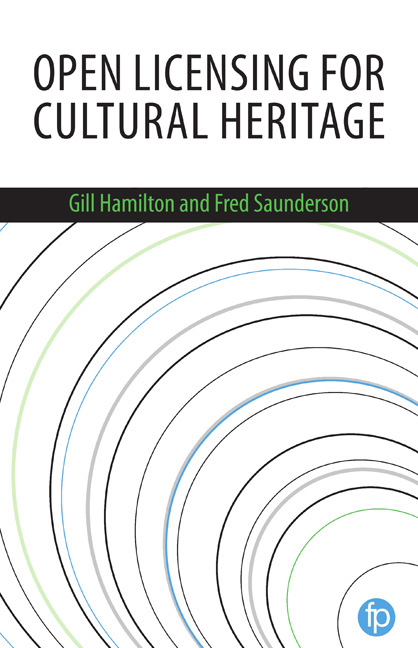Book contents
- Frontmatter
- Contents
- List of figures and tables
- Acknowledgements
- About the authors
- 1 Introduction
- 2 The open movement: its history and development
- 3 Copyright and licensing: a background
- 4 Open licensing: the logical option for cultural heritage
- Introduction to case studies
- 5 Small steps, big impact – how SMK became SMK Open
- 6 The British Library experience of open metadata licensing
- 7 Open policy and collaboration with Wikimedia at the National Library of Wales
- 8 Newcastle Libraries – the public library as a place to share culture
- 9 Developing open licensing at the National Library of Scotland
- 10 The Wellcome Library
- 11 Developing an open educational resources policy and open approaches to mitigate risk at University of Edinburgh
- 12 How to implement open licensing
- 13 Using and reusing openly licensed resources
- 14 Conclusion
- Index
11 - Developing an open educational resources policy and open approaches to mitigate risk at University of Edinburgh
Published online by Cambridge University Press: 08 June 2018
- Frontmatter
- Contents
- List of figures and tables
- Acknowledgements
- About the authors
- 1 Introduction
- 2 The open movement: its history and development
- 3 Copyright and licensing: a background
- 4 Open licensing: the logical option for cultural heritage
- Introduction to case studies
- 5 Small steps, big impact – how SMK became SMK Open
- 6 The British Library experience of open metadata licensing
- 7 Open policy and collaboration with Wikimedia at the National Library of Wales
- 8 Newcastle Libraries – the public library as a place to share culture
- 9 Developing open licensing at the National Library of Scotland
- 10 The Wellcome Library
- 11 Developing an open educational resources policy and open approaches to mitigate risk at University of Edinburgh
- 12 How to implement open licensing
- 13 Using and reusing openly licensed resources
- 14 Conclusion
- Index
Summary
There is a risk to not being open, and not being open now will cost us money in the future.
This case study describes how the University of Edinburgh plans its approach to open educational resources in support of learning and teaching and offers suggestions to others working to make open educational resources sustainable in higher education institutions. It offers a clear value proposition for aligning open educational resources activities within institutional budgets and strategies for learning, teaching and research in the context of a digital university. Many cultural institutions making the move towards open practice struggle with the challenges of securing high-level ‘buy-in’ to support such initiatives; this case study also considers the institutional risks of ‘open washing’ and neglecting staff development in this area.
The University of Edinburgh leads the Scottish higher education sector in having a published open educational resources policy in place and a central service to support staff development in using open educational resources for learning and teaching. The University promotes and incentivises open educational practice in a range of ways through course design, institutional infrastructure and open knowledge partnerships, including hosting a Wikimedian in Residence to embed open practices inside and outwith the curriculum.
The University of Edinburgh context
Discussion started about an open educational resources policy for the University of Edinburgh in 2014. A high-level task group was established, including key opinion shapers from around the University and the Student Association (EUSA). The task group aimed to explore how high quality learning materials could be made open, not only for students within the University, but across Scotland and to the wider world.
At the time the University was riding the wave of global interest in massive open online courses (MOOCs) and in the light of the upcoming independence referendum many in Scotland saw a strategic opportunity to contribute to a fairer society via open educational practice. The resulting open educational resources vision for the University of Edinburgh has three strands designed to help learning technologists and academic colleagues decide which materials to release and where. The University of Edinburgh open educational resources policy was published to deliver the vision in 2016 and to support colleagues in making positive decisions for open practice.
Information
- Type
- Chapter
- Information
- Open Licensing for Cultural Heritage , pp. 159 - 166Publisher: FacetPrint publication year: 2017
